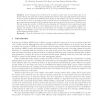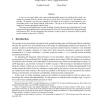199 search results - page 23 / 40 » Adaptive Proofs of Knowledge in the Random Oracle Model |
SCN
2008
Springer
14 years 11 months ago
2008
Springer
While recent timed-release encryption (TRE) schemes are implicitly supported by a certificateless encryption (CLE) mechanism, the security models of CLE and TRE differ and there is...
143
click to vote
JOC
2010
14 years 9 months ago
2010
We present a new encryption scheme which is secure against adaptive chosenciphertext attack (or CCA2-secure) in the standard model (i.e. without the use of random oracle). Our sch...
CARDIS
2010
Springer
15 years 2 months ago
2010
Springer
This paper establishes a novel model for RFID schemes where readers are not continuously connected to the back office, but only periodically. Furthermore, adversaries are not only ...
PKC
2009
Springer
15 years 11 months ago
2009
Springer
A key exchange protocol allows a set of parties to agree upon a secret session key over a public network. Two-party key exchange (2PKE) protocols have been rigorously analyzed unde...
FOCS
2000
IEEE
15 years 3 months ago
2000
IEEE
A zap is a two-round, public coin witness-indistinguishable protocol in which the first round, consisting of a message from the verifier to the prover, can be fixed “once and...


